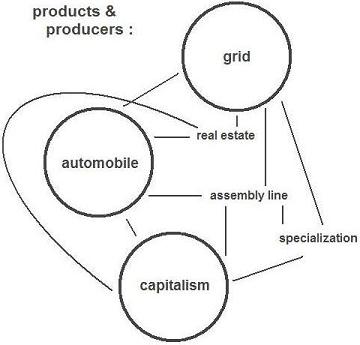|
Secondly, as a pure product/producer, the assembly line itself is responsible for producing something much greater than profit increase and salary/revenue efficiency. The role of specialization. As a staple of factory floor infrastructure, the assembly line constrains individuals by space and task. Large scale separation among workers, or multiple producers of a single product, was claimed some time ago as a means to 'effectively' manage and maintain disenfranchising power structures (cogs in the machine sort of thing).
We are not interested so much in socialism, but rather exemplifications of piles and stacks. Specialization, be it radio-cardiologists, field goal kickers, or a run of the mill assembly line worker, is stack based employment. As is the case in most office or apartment buildings, where the fourth floor is in direct contact with only the third floor below and fifth floor above, specialized careerists are likely to be oblivious concerning the overall architectural features of their fields. City grids exist in similar stack fashion, where all parallel streets exist irregardless of one another. (Conversely, objects in piles lack quantifiable positions in space, and exhibit contact with numerous other objects located within the pile. Migrating a pile can only increase object contact and knowledge.) As is clear now, (opposite image) the relationship between and products of grids, capitalism, and automobiles, tend to benefit and assure the growth of one another. A triadic stack to be cautious of.
|
|
| previous page | home | next page |
